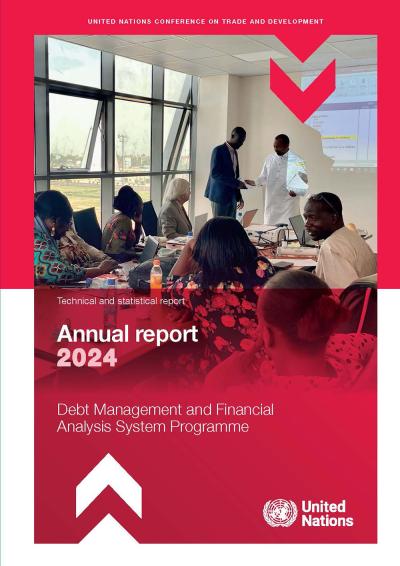
The 2024 DMFAS Annual report describes the activities, achievements and financial situation of the Debt Management and Financial Analysis System (DMFAS) Programme of UNCTAD in 2024 and over the five-year of implementation of the 2020-2024 strategic plan.
It is intended for the Programme's donors, development partners and beneficiary countries, and for all those interested in debt and development issues.
Over its 43 years of existence, the Programme has provided assistance to 118 institutions in 76 developing countries.
In 2024, 85 institutions from 61 economies adopted DMFAS. Over two thirds of DMFAS users had either low-income or lower-middle-income country status. Six new countries adopted the DMFAS system during the strategic plan period.
Between 2020 and 2024, the landscape of external debt sustainability in developing countries remained a pressing concern for the international community, exacerbated by overlapping global crises.
The combined impacts of conflicts, climate change, aggressive monetary tightening in response to high inflation, and the lingering socioeconomic effects of the COVID-19 pandemic placed significant strain on public finances. With revenues greatly eroded by the disruptions associated with crisis, governments everywhere increasingly relied on public borrowing to meet urgent spending needs, leading to rising debt levels and heavier repayment burdens, particularly in an environment of escalating interest rates. These further heightened vulnerabilities and the risk of debt distress.
Transparency in debt data remained a critical challenge in many countries. It is widely recognized that in such circumstances, the effective management of public resources and liabilities, including public debt, is a necessity and sound public financial and debt management has become more essential than ever.
Capacity to record, monitor and report effectively on public debt can help identify risks to debt sustainability while countries need to rely on borrowing to address ongoing global economic shocks. Transparent and effective debt management also plays a vital role during the implementation of emergency financing mechanisms and debt relief measures such as the G20 Common Framework, introduced by the international community, to support crisis-affected economies.
At the same time, the capacity of many developing countries to manage their debt efficiently, was undermined by increasingly complex debt portfolios, significant weaknesses in legal and institutional frameworks, staffing, skills and systems.
In this context, the DMFAS strategic plan 2020-2024 offered an effective response to the grave concerns about the overall outlook for external debt sustainability in developing countries and the challenges associated with the global crises. Initially covering a four-year period, this plan was extended for an additional year due to the COVID-19 pandemic.
A key priority of the 2020-2024 strategic plan was the development of the next generation of the DMFAS software, DMFAS 7. The Programme also continued to enhance DMFAS 6 through the distribution of four releases between 2020 and 2024, including one release in September 2024.


